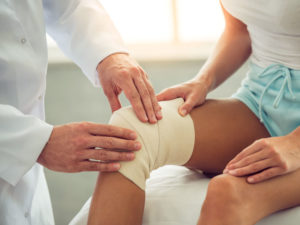This week’s blog is featuring an article written by one of our clients. We are grateful for the opportunity to work together with the Women’s College Hospital as part of their new ambulatory joint replacement surgery program. Patients typically stay in the hospital for up to three days after a knee surgery. This program allows patients to recover from same-day joint replacement surgery from the comfort of their homes while still being connected to their healthcare team.
April 30, 2018
By Atifa Hamir
This article is part three of a four-part series about Women’s College Hospital’s new ambulatory (outpatient) joint replacement surgery program. Part four will shared in next week’s issue of Connect and will focus on ambulatory anesthesia. You can view part one and part two here.
The virtual care component of Women’s College Hospital’s new ambulatory joint replacement surgery program is doing more than just allowing patients to recover from surgery at home. According to Dr. Daniel Cornejo-Palma, general surgery resident and evaluator within the program, this innovative connection is busting healthcare myths about patient and provider interaction, proving that a patient who is at home can have the same number, if not more, of interactions with their care team as they would in hospital.
“A lot of people have this idea that once you’re out of hospital, you no longer have any contact with your providers,” says Dr. Cornejo-Palma. “But the reality for our patients is that with this technology, they’re able to have video calls with their care team, give us regular updates about how they’re feeling and essentially stay in touch with their providers throughout their entire recovery process without ever having to go back to the hospital.”
The ambulatory joint replacement surgery program, which launched earlier this year, allows patients to undergo knee replacement surgery and be discharged home in the same day. Patients continue to receive care at home through a mobile app called aTouchAway by Aetonix. The app, which can be used on any smartphone or tablet device, offers a variety of beneficial features including video calling, real time data sharing and alerts that can be used to remind patients when to take their medication.
Once a patient goes home after their surgery, the app prompts them every two hours to enter information about key health indicators, such as how much pain they are in or if they are experiencing any nausea. Providers then use this information to assess how a patient’s recovery is going as well as to note if a patient’s medication needs to be changed.
“Sometimes patients will say they’re experiencing minimal pain which might trigger us to reduce their pain medication or they may note that they’re experiencing some constipation which tells us they may benefit from a stool softener,” says Dr. Cornejo-Palma. “The information they give us helps us understand their healing process and also helps guide the conversations we have with them in our daily video calls.”
The app is set up to run for three to four days post-op — the same amount of time that patients spend on average in hospital after a knee replacement surgery. For patients who do not have access to such devices or to the internet, the program offers tablets on loan at no cost, which come with the app already downloaded and an existing internet connection. Once the early stage of recovery has been passed, a patient’s care team will assess if the patient is ok to carry on their own or if an extension is required.
“The great thing about this type of technology is that is really helps us enhance the customer service aspect of healthcare,” says Dr. Cornejo-Palma. “The interaction that patients get out of this helps us, as providers, ensure that they’re having the best experience with their care while reinforcing the fact that care doesn’t have to stop at a hospital’s doors.”
Featured image courtesy of Healthline.
